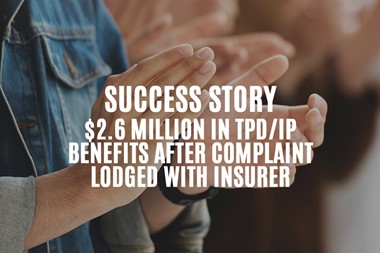Disability insurance like TPD or income protection (often inside your super) provides crucial lump sum benefits if someone becomes sick or injured and cannot return to work. We are Australia’s leading consumer superannuation and insurance law firm. We take on the complex and complicated cases that other firms won’t. And that’s precisely what we did for our client’s claims related to mental illness, securing $2.6 million in well-deserved benefits.
You can read more detail about TPD and income protection and securing a successful claim in our earlier blogs;
- Your guide to making a successful TPD claim
- What is income protection, and how do income protection claims work?
Case review - TPD and income protection claims due to mental illness
Overview
We acted for a client with a mental health condition in respect of two Total and Permanent Disablement (TPD) claims and an income protection (IP) claim. The claims were initially lodged years prior to the client seeking our help.
The definition that applied to our client’s TPD claims was an “own occupation” TPD definition. This is a TPD definition which only required that our client was unlikely ever to return to work within their last occupation.
You can learn more about TPD definitions, including “own occupation”, in our earlier blog, “Differences in TPD definitions effect how insurers pay out claims”.
Despite this, the insurer declined our client’s TPD claims several years ago. As our client was unwell and financially vulnerable at the time, they did not have the capacity to dispute the insurer’s decision to decline their claims.
Appeal of original decision submitted with new medical evidence
Subsequently, and some years later, our client contacted us for advice. We obtained updated and supportive medical opinions from their treating doctors and submitted an internal appeal of the insurer’s decision to decline the claims.
We made legal submissions in our internal appeal targeted at the applicable TPD definition and how both the historical and new medical evidence supported an approval of the claims.
As there were some delays in the consideration of our internal appeal, and the insurer had not provided a final response within the time prescribed in the Life Insurance Code of Practice, we submitted a complaint with the Life Code Compliance Committee on behalf of our client.
Claims approved, and client secures $2.6m in benefits
Within five months of our complaint being lodged, the insurer approved our client’s claims.
Our client subsequently received approximately $2,600,000 in total insurance benefits. We are now assisting our client with an ongoing claim for interest payments on the basis that their claims could have been approved much earlier in the claims process.
The insurer’s decline of our client’s TPD claims was detrimental to our client, who was mentally unwell and financially vulnerable at the time of the decline. Had our client not sought advice from our office they may never have had the capacity to pursue the claims further and never received payment of their TPD benefits.
As a result of their TPD claims being approved, our client is now financially secure, able to afford medical treatment and care and plan for their future.
Get help from a TPD lawyer
Many people who stop work due to injury or illness will lodge a TPD claim, or income protection claim, on their own. While many of these may be successful, it is not uncommon for claims to be denied or delayed (and frustrated by the insurer), often to a point of the client simply giving up.
It’s important that if you receive an adverse decision (like a rejected claim) in the first instance from an insurer, you should not simply accept that initial decision. Get in touch with our TPD and income protection team for free advice. It costs you nothing to find out where you stand.
Contacting Berrill & Watson
📞 Melbourne: 03 9448 8048
📞 Brisbane: 07 3013 4300
📞 Anywhere else in Australia: 03 9448 8048
How we charge
We are Australia's best-value superannuation/insurance law firm. Other law firms charge nearly double (& sometimes more than double) what we charge. So, if you get a quote from them, or have a cost agreement, ask us what we will charge you.

